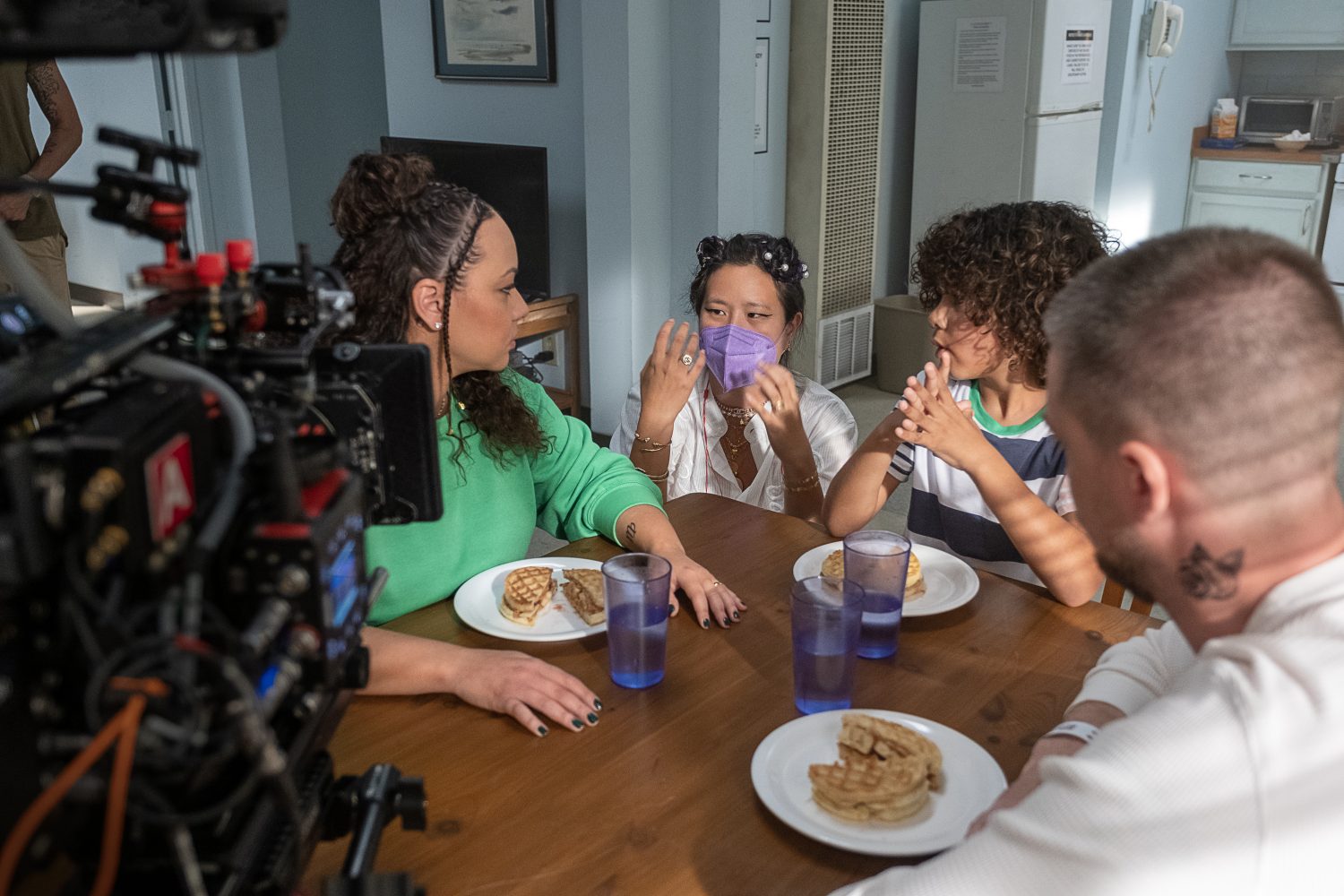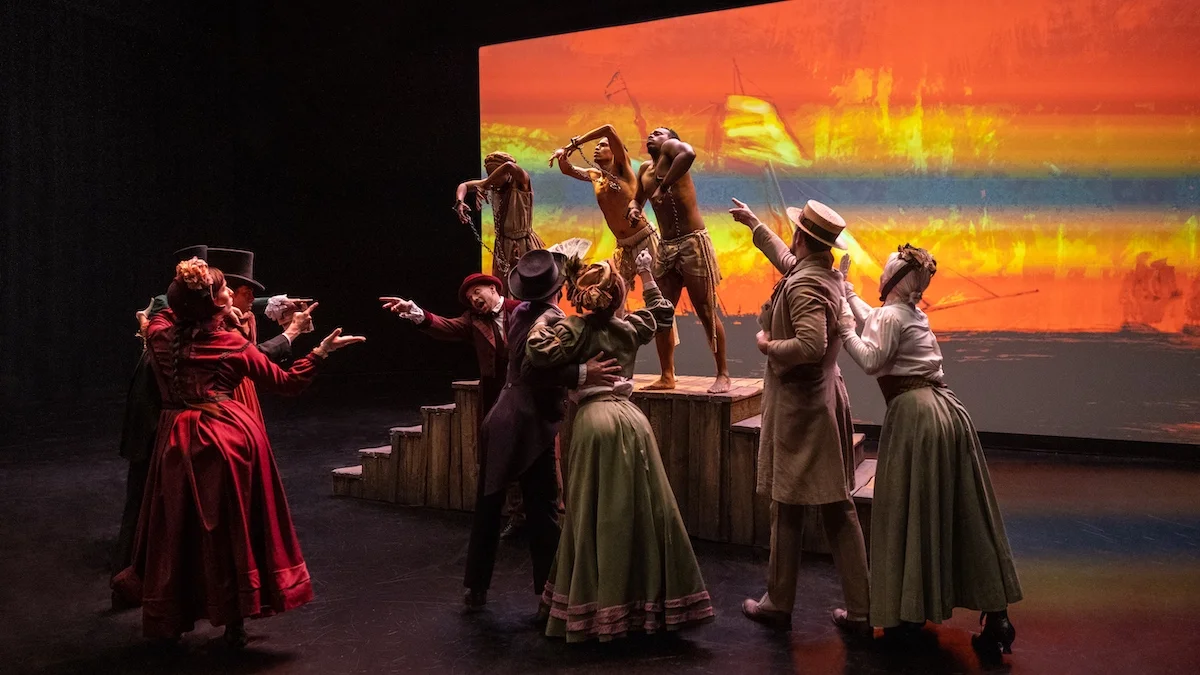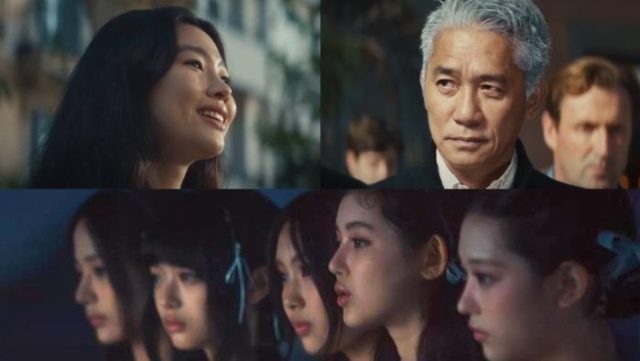Editor’s Note: A previous version of this article mistakenly transcribed “Essie Justice” as “SC Justice.”
For Ashley Jones, slow Sundays with the family aren’t made of movie nights or brunch with bespectacled grandparents; instead, they’re spent between the bare blue walls of San Quentin State Prison’s visitation cabin.
The protagonist of Starz’ hit dramedy “Blindspotting,” Ashley (Jasmine Cephas Jones) must learn to navigate the world on her own when her partner of 12 years, Miles (Rafael Casal), is suddenly incarcerated. Juggling her work, her in-laws and her ever-curious 7-year-old son, Sean (Atticus Woodward), Ashley’s life is a constant minefield of comedy and chaos.
First made into a film and later adapted for television, “Blindspotting” has been the decade-long passion project of accomplished writer-producer Jess Wu Calder. After making her directorial debut with episodes three and four of the show’s sophomore season this spring, Calder sat down with Character Media to discuss her inspiration and experience telling this beloved story.

Character Media: Before making your directorial debut, you had years of experience in both screenwriting and producing. As you made this transition, did your history in each of these roles influence the way you approached directing?
Jess Wu Calder: The fact that I had studied screenwriting in college really helped me out as a producer because it gave me a chance to empathize with the writing process. On top of helping me understand [the] story really well, it allowed me to connect with writers on a more human level. There’s a misconception in this industry that it’s easy to replace a writer — that they’re not an essential part of the process. But I can say that in my entire 20-year career of making film and TV, that’s not something we’ve ever done. We have the writers on set the entire time, from the writer’s room to the mix stage to post. I’ve always been a big proponent that none of this would exist without the writers, so they’re an essential part of my process.
Going into directing, I would say that being a producer really helped, at least the way I do it. I’ve always been really hands-on from beginning to end; there hasn’t been a film that I’ve been a part of that I haven’t been on set every day. And a benefit of being such a hands-on producer is that, consciously or not, I’ve been able to shadow some of the most amazing directors at work today. And it’s just been such a wonderful, accidental education for me.
CM: Before making your directorial debut, you had years of experience in both screenwriting and producing. As you made this transition, did your history in each of these roles influence the way you approached directing?
JWC: The fact that I had studied screenwriting in college really helped me out as a producer because it gave me a chance to empathize with the writing process. On top of helping me understand [the] story really well, it allowed me to connect with writers on a more human level. There’s a misconception in this industry that it’s easy to replace a writer — that they’re not an essential part of the process. But I can say that in my entire 20-year career of making film and TV, that’s not something we’ve ever done. We have the writers on set the entire time, from the writer’s room to the mix stage to post. I’ve always been a big proponent that none of this would exist without the writers, so they’re an essential part of my process.
Going into directing, I would say that being a producer really helped, at least the way I do it. I’ve always been really hands-on from beginning to end; there hasn’t been a film that I’ve been a part of that I haven’t been on set every day. And a benefit of being such a hands-on producer is that, consciously or not, I’ve been able to shadow some of the most amazing directors at work today. And it’s just been such a wonderful, accidental education for me.
CM: You’ve been working on “Blindspotting” for over a decade now, and I’m sure it’s become a sort of second family. As a new director, how did having these long-time relationships with your actors and crew help you take on the challenge?
JWC: I wish that every first-time director was able to have such an incredible support system. I say this all the time, but I’ve been so lucky. I wouldn’t say it was easy, because directing is not; but, I will say there was a real comfort level. We’d all been working together for such a long time, and we were always on the same creative page. Everybody was really understanding that it was my first time, so they all worked together to help me feel safe while also trusting me to carry out such ambitious ideas. I’m just really thankfu
CM: Your first episode of “Blindspotting” blends so many different forms of media, from music to dance to almost pantomime-style storybook sets. How did you come up with this concept, and what did it take to bring it all together?
JWC: It was an amazing, difficult, challenging, wonderful process. When I got the script, all it said was, “Sean learns the history of the N-word through dance,” and it was an incredible act of trust from the whole team to let me figure that out.
I’m so lucky that I worked with who I think is the best choreographer in the world, Jon Boogz. When we first sat down and started thinking about how to tell the story, it came organically to us to tell it through time — to pick several real, historical moments that represented the story. But we didn’t want to overwhelm Sean or the audience; it’s such a horrific word and its history is so weighty, it was really important to us to balance that harshness with the beauty of the movement, of dance.
Once we had the choreography, our DP Tarin Anderson and her incredible lighting team translated my vision beautifully. I wanted it to feel like the story was stuttering along, to show how hard Sean’s young brain was working to try and process all the flickering information.
Our production designer Alicia also did an incredible job. Everything was so well thought out. Our set pieces — especially the auction blocks — were based on actual historical items. She spent so much time looking through different children’s books to find the best illustrative style for the backdrops. In the diner set, the whole team was really mindful to make sure nothing got in the way of the dance, so all the doors and countertops were made of glass. All of that together made for a very emotional beat.
Altogether, it was really hard, but it was definitely a team effort. We rose together as a team to the challenge to make sure everything was right.

CM: A lot of your work has revolved around social justice, discrimination, separation, incarceration and other important — albeit heavy — topics. Why are you drawn to telling these stories, and how do you prepare to tell them as accurately and authentically as possible?
JWC: We work with a lot of great organizations, and we talk to them pretty much the entire time. For season two, episode three of “Blindspotting,” there was an incredible article that I found online about a couple that actually stayed in a conjugation — a family visitation cabin — for a weekend. The journalist followed them and stayed with them, and she had thousands of pictures. I spoke to her for a long time about what that process was like. We also spoke to everybody at San Quentin; we asked for all the exact information guides that a family member would get if they were to visit. We scouted a lot while we were there, and a lot of what happens in the episode was informed by that.
And yes, we do a lot of this kind of research, but for us it doesn’t feel as heavy because what we’re trying to do is encourage people to look around — to understand that this is not just a problem that affects someone way over there. There’s a great group called the Essie Justice Group that’s all about the fact that one in four women has a loved one that’s incarcerated. By making this show, we’re trying to say that Ashley is probably you, a friend, or a friend of a friend. Her family is your family. So please don’t think of this as a problem that doesn’t affect you because I assure you it does.
But then at the end of the day, we all just really like to laugh. So even with all the research and all the tension, we try to add in some humor. We always joke that “Blindspotting” was meant to be a buddy comedy — a family sitcom — in a world that wouldn’t let it. And so I think our goal in making the show is to try and change that.
CM: You’ve worked with your husband, Keith, co-producing “Blindspotting” and co-founding Snoot Entertainment. What’s it like working so closely together?
JWC: I think we’re in a very unique situation because we met during a summer class at NYU; we were actually on each other’s very first film crew ever. So, whenever anyone asks me what it’s like to work with my husband, I have to be honest and say that it’s all I’ve ever known. Ever since I was 19, I feel like we’ve grown up as adults and into this industry together.
I sort of laugh about it because the biggest change we’ve had to our dynamic was actually in this season of “Blindspotting,” because we’ve always been producing partners but I stepped up to be a director. So it was fun to figure out what that new relationship was going to be. But it was awesome. It’s great to have your husband be your biggest champion — to believe in you as a person and a filmmaker.
CM: In previous interviews, you’ve talked about your mother being your inspiration. Can you share a little bit about how she motivates you?
JWC: We are a classic immigrant story. She came to America to give me a different life, and it moves me every time I think about it.
I grew up looking up to my mom because she worked two jobs. She was a nurse — which people often think is a sort of thankless job — and on top of that, she also put herself through night school to get her master’s. She had so much ambition. She came from a tiny village in Taiwan and didn’t even speak English, but she knew she was going to figure it out. And she did. So, I think I got this from her: the idea that if you put your mind to it and work hard enough, you can pretty much accomplish anything.
On top of that, she also gave me my love for movies, whether she intended to or not. I kind of laugh about this because obviously she was the classic Asian mom who envisioned me being a lawyer or a doctor. But she always had these great films on while I was growing up because that’s how she learned English, and so she had me watch “On the Waterfront,” “Cleopatra,” all these classic old films. And seeing how those films helped shape her — gave her language, helped her better herself — I knew that’s what I wanted to do.
She’s watched every single film I’ve ever made. She makes all her friends watch them. And she always tells me that she’s proud.







